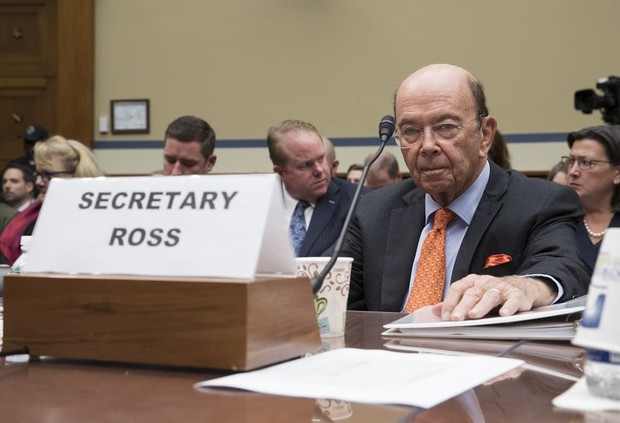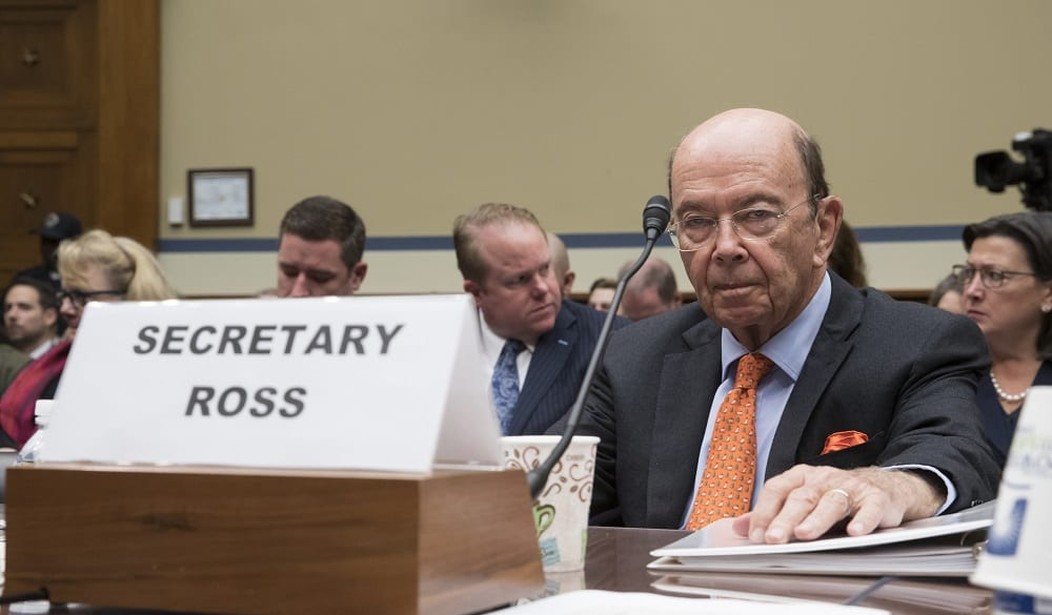
Commerce Secretary Wilbur Ross appears before the House Committee on Oversight and Government Reform to discuss preparing for the 2020 Census, on Capitol Hill in Washington, Thursday, Oct. 12, 2017. The Trump administration acknowledged on Thursday that billions more dollars are “urgently needed” to ensure a fair and accurate count during the 2020 Census. (AP Photo/J. Scott Applewhite)
When historians, to the extent that such personages still actually exist rather than the pathetic collection of liberal assclowns who style themselves historians, write about Donald Trump’s first term as president, one theme that will stand out is the way the left was able to mobilize its allies in the federal judiciary to carry out an partisan campaign of lawfare to defend policies that had been rejected by the nation in the 2016 election. From the “travel ban,” to sanctuary cities to DACA to detaining illegal immigrant to most every thing else the left objects to, compliant and complicit federal judges have teamed up with their buddies in the Democrat party to stop even minor policy changes that would change the status quo. One of those battles came to a head today in the US Supreme Court when the administration was forced to contend with a challenge to its ability to add into the US Census for 2020 a question asking about the citizenship status of the respondent.
This is the way a 538.com writer described it from her fainting couch:
The case before the Supreme Court is about the legality of Commerce Secretary Wilbur Ross’s decision to add a citizenship question to the 2020 census; it has been challenged by an array of states and civil rights organizations. Ross says the question was added in response to a request from the Justice Department for more detailed citizenship data to help enforce the Voting Rights Act, but three lower court judges have all concluded that the evidence shows he had already decided to add the question and used the Justice Department as a pretext. The judges concluded, too, that the administration violated standards of transparency and accountability required of executive agencies by failing to test the question and ignoring expert advice against adding it. Two also ruled that the question would violate the Constitution because it seems likely to result in an undercount.
The only close to sane objection is that the administration may have not followed Census Bureau procedure. Census questions are not covered by Federal rulemaking procedure and there is literally no prohibition on what can be asked so long as the question is approved by the Office of Management and Budget. Every Census has an undercount, that’s why the Census Bureau hires tens of thousands of field enumerators to try to run down households that do not answer the Census. An undercount based on failure of residents of the US to fill out the form and return it is hardly grounds for blaming that undercount on a particular question, and even then, so f***ing what? And a lot of this was amusing as the same people not insisting on an accurate enumeration were the same clowns were before the Supreme Court in 1999 arguing that statistical sampling was all that was needed (see Department of Commerce v. United States House.)
Citizenship had been a regular question on the Census since 1820.

The change this time is that the question will be asked of all respondents and not just a sample.
The reason for the anxiety on the part of Democrats is pretty simple to understand. The Census count governs redistricting. If illegals panic at the citizenship question (I think that is specious bullsh**, but whatever), then states with large numbers of illegals–looking at you California–will lose congressional seats. And some scholars contend that it is legal to draw districts based on the number of voters rather than the number of people. If that was attempted, and found to be legal, then the Electoral College would look radically different in 2024.
Today’s hearing did not go well for the Democrats and their lower court allies.
Arguing on behalf of the state and local governments challenging the decision to add the citizenship question, New York Solicitor General Barbara Underwood began by complaining that Ross had decided to add the citizenship question even though the documents on which he relied to make that decision contained strong evidence that doing so would lead to an inaccurate count. All the reasons that Ross has cited to justify adding the question, Underwood asserted, are false.
Chief Justice John Roberts pushed back, asking Underwood whether having the citizenship data wouldn’t affect enforcement of the federal Voting Rights Act. Isn’t this critical data, Roberts asked?
Justice Brett Kavanaugh noted that the United Nations recommends including a citizenship question. Not only has the United States often asked the question, Kavanaugh stressed, but other countries – including Spain, Germany, Mexico, Canada and Ireland – also ask about citizenship. Does this international and historical practice affect how we look at the decision to add the question? Kavanaugh queried.
Underwood responded that the information provided by the question is “very useful for a country to have.” But should it be included on the census, she countered, whose principal purpose is to count people, knowing that it will reduce response rates?
Justices Samuel Alito and Neil Gorsuch, however, pushed back against the idea that including the citizenship question, standing alone, was the root cause of a lower response rate. Citizens and noncitizens are different in a lot of ways other than whether they have citizenship, Alito observed: For example, there may be socioeconomic differences between a household with citizens and one with noncitizens, as well as language differences. So there may be other explanations, Alito suggested, for why households with noncitizens would be less likely to return their citizenship questionnaires.
The questioning indicated a pretty solid 5-4 split. The conservatives and Roberts bought none of the arguments against the question, the liberals acted like sockpuppets for the Democrats. If illegals shun the Census, I’m fine with that. Jurisdictions shouldn’t be rewarded with political power and increased funding for harboring people who can’t legally reside here. If they respond and states are able to say they will redistrict based on voters and not people, I’ll be ecstatic because the advantage of recruiting illegals will be gone forever and then everyone will have a stake in enforcing immigration law.
=========
=========
Like what you see? Then visit my story archive.
Follow @streiffredstate
I’m on Facebook. Drop by and join the fun there.
=========
=========













Join the conversation as a VIP Member